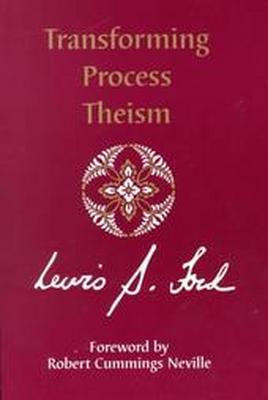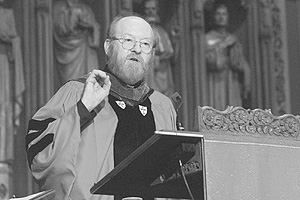
AnthonyFlood.com
Panentheism. Revisionism. Anarchocapitalism.


From Philosophy and Phenomenological Research, , Vo.. 38, No. 4. (June 1975) 578-581. A review of Robert C. Neville, The Cosmology of Freedom Nashville: Vanderbilt University Press, 1998. New Haven: Yale University Press, 1974. Pp. 385. See also Neville's Foreword to Ford's Transforming Process Theism, elsewhere on this site.
A Review of
Robert Cummings Neville, The Cosmology of Freedom
Lewis S. Ford
It is a pleasure to read such lucid prose, especially after the massive turgidity of Neville’s maiden effort. God the Creator was brilliant but obscure, with a sense of excessive aridity and wordy digressions. The morphology of a central thesis, that metaphysical pluralism is undergirded by ontological monism is carefully restated in chapter two of the present book, though one must look to God the Creator for the argument concerning its genesis.
The argument of The Cosmology of Freedom has a finely nuanced analysis of private freedom, including freedom of the will, deliberation, and decision. In the second half Neville explores the external, public conditions for this freedom, such as political rights, the grounds for a pluralistic society, methods of social integration, and a theoretical analysis of participatory democracy. (His individual asides are excellent, for example the importance of having a history [pages 232 ff.].) A participatory democracy usually means “one man, one vote.” Here Neville expertly criticizes Robert Dahl’s After the Revolution based on this premise (pages 336-40). Even the students shouting this slogan in the 1960’s did not insist that they have a say strictly proportionate to their numbers; usually they agreed to some group representing student and faculty interest, rarely insisting on more than parity with the faculty. The true principle of participatory democracy concerns the rules “for setting the conditions under which decisions or determinations are made” (page 342). Here Neville enunciates the principle of power: “A participatory democracy ought to render each person the power to influence the conditions under which decisions are made in a proportion commensurate with his relevance” (page 346).
Neville relies quite heavily on McLuhan’s critique of the present post-literate society, just as he uses Eric Havelock’s analysis of Plato’s critique of the role of poetry as it functioned in Greek preliterate society (page 319-21). He has an excellent critique of Marx for denying privacy, the sole source of creativity.
The initial analysis of personal freedom can be read as a bridge between Alfred North Whitehead and Paul Weiss. It is essential to Weiss’ modalistic pluralism that he distinguish between essential and accidental features. If the accidental features are essential, then the unity is too tight and there can be only one mode of being as Whitehead had affirmed according to his ontological principle. Accidental features must nevertheless be required, for otherwise there would be no need for the additional modes of being. Neville retains the same distinction that Weiss needs, but he sees that the accidental features are identical with what Whitehead had conceived as the “initial data,” while the essential features conformed to his “subjective forms.”
Another way of reading Neville’s initial analysis is to compare it with Whitehead’s. Here the result is thoroughly ambiguous. On the one hand, Neville supports most of the essential thesis with independent arguments. On the other hand, he rejects characteristic claims while importing most of their initial plausibility, especially with respect to the theory of time. He insists that time makes a difference and is very good in explicating the logic of tenses. His favorite ploy treats the determinist as a Parmenidean conceiving an unchanging volume of events, and showing the folly of this position. Passage does make a difference, but we need not follow Whitehead in identifying subjectivity with present immediacy and we need not be troubled by the objectivity of the past. His theory of the human self is essentially fiduciary, with the earlier moments making commitments on behalf of the later moments of the self. Put in Whiteheadian terms, his self is essentially a personally ordered society of occasions enduring through time, rather than the successive, momentary, individual occasion itself.
This greatly simplifies the analysis of what it means to be subjective and enables Neville to claim the distinctiveness for the human creativity (page 201). If every occasion is fleetingly subjective, as Whitehead thought, then not only must we affirm that every occasion whatsoever is subjective in its presentness (his so-called “panpsychism”), but each must receive its subjectivity from another. Thus we must conceive some transcendent agent giving each occasion its initial selfhood (Whitehead’s necessary theism). Neville’s analysis is more acceptable to most philosophers because it dispenses with these two controversial assumptions while at the same time upholding and defending its careful analysis of creativity as temporal self-constitution. But then the problem is not faced with all seriousness. Only Sartre with his stark concern for the momentary self saw the real problem: how can the self, new in every moment, arise out of nothing? His own answer trades on the traditional doctrine of creation out of nothing, so much so that otherwise it would be unintelligible. As it is, Whitehead’s analysis is far more cogent.
But this argument requires that God tempts every person to do the good. This is perhaps an uncharacteristic way of looking at Whitehead’s theory but it remains that each occasion embarks on its subjective career only by means of an initial aim supplied by God. Neville dispenses with this initial aim while yet giving careful analysis of freedom as norm-determining values. He dispenses with the transcendent tempter because there is no need for this initial purposing lure. Traditionally, however, we have not thought that there need be any temptation for the emergence of the good self. In fact, it is the presence of evil that needs explanation, although Tillich’s careful analysis in volume two of the Systematic Theology of “dreaming innocence” shows that the emergence of the self is very much at the core of the problem. If there is a tempter for good, there is also a tempter for evil. The serpent in paradise is absolutely essential for Eve’s fall, but this is unpalatable for optimistic Whiteheadians.
Posted March 25, 2007